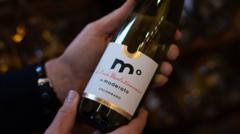In a remarkable shift, French wine producers are now wholeheartedly diving into the market for alcohol-free wines, driven by innovation and changing consumer preferences.
Raising a Glass to Change: Alcohol-Free Wine Takes Root in France

Raising a Glass to Change: Alcohol-Free Wine Takes Root in France
The wine industry in France is embracing the unthinkable with the arrival of quality alcohol-free wines, challenging traditional perceptions.
In the heart of Bordeaux, a quiet revolution is underway as the unexpected trend of alcohol-free wine gains traction. Once considered a taboo topic among winemakers, the concept of producing wine without alcohol is now being embraced, propelled by advances in technology and evolving consumer habits. Bordeaux oenologist Frédéric Brochet, a pivotal figure in this movement, acknowledges that initial attempts at creating non-alcoholic wine were lackluster. However, he asserts that significant strides have been made, setting the stage for what he believes could be a transformative era for the wine industry.
The launch of Bordeaux's first dedicated alcohol-free wine shop, Les Belles Grappes, reflects this newfound acceptance. Owner Alexandre Kettaneh reports an influx of local wine growers interested in entering this innovative market. With domestic wine sales declining and competition from other beverages on the rise, producers are feeling the urgency to adapt their offerings. This is further highlighted by the fact that 10% of the French beer market now consists of alcohol-free options, a trend that is gaining ground in neighboring Spain as well.
The growth in alcohol-free alternatives can be attributed to improved production methods, shifting cultural norms, and a younger demographic preferring healthier lifestyles. No longer reliant on the outdated technique of simply boiling away alcohol, wine makers now utilize low-temperature vacuum distillation and aroma-capturing technologies. These advancements yield products that can proudly bear the wine label without sacrificing quality.
For producers like Coralie de Bouard of the Clos De Bouard estate, adapting to consumer demand has proven beneficial. Once considered a pariah for her non-alcoholic offerings, De Bouard's fortitude has led her family to recognize her pioneering role, which has helped the estate thrive amidst economic challenges.
As the alcohol-free wine industry gains momentum, the traditional world of wine finds itself at a crossroads. In a culture that once excluded non-drinkers from the communal experience of wine appreciation, promoters of these new wines advocate for inclusivity. The once rigid boundaries of wine culture are softening, inviting all to partake in the time-honored traditions of sharing, discussing, and enjoying wine.
Oenologist Brochet reflects on this evolution, reminding us that innovation has always been part of the vinous narrative. He likens this sea change to historical milestones in winemaking practices, suggesting that embracing the new could preserve not just the industry but also the cherished customs that come with it. In the words of poet Paul Valery, "What is tradition, but an innovation that succeeded?" With alcohol-free wines capturing the imagination of consumers, it appears that French wine culture is poised for a refreshing renaissance.




